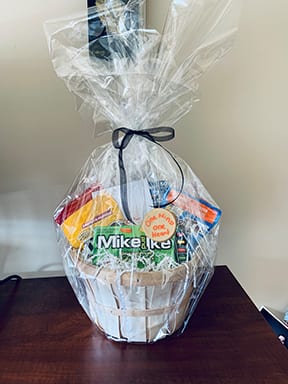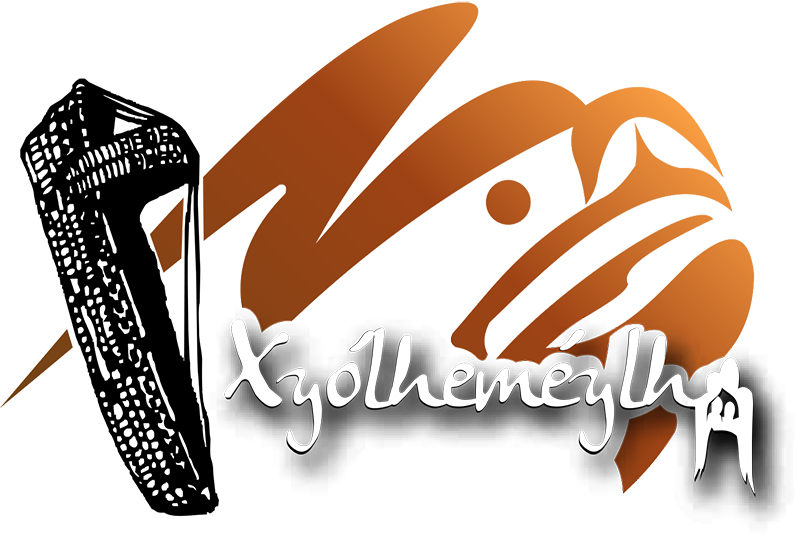Fraser Valley Aboriginal Children & Family Services Society
Spring 2021 NewsletterMessage from the Board of Directors
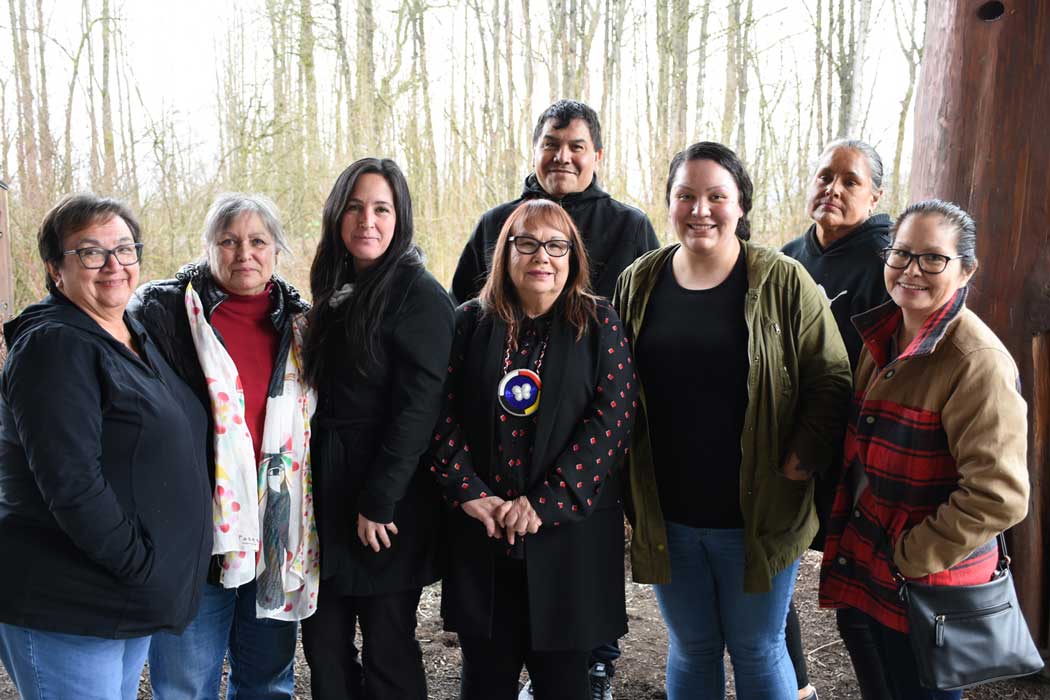
From left to right: Helen Joe, Marion Mussell, Wenona Hall, Glenda Campbell, Peter John, Jennifer Janik, Judy Douglas, Paula Olmstead. Missing: Tammy Bartz.
Spring equinox arrived in March and despite some chilly weather spring is in the air with all the optimism it brings.
We continue to live and work within the Covid-19 restrictions and must continue to be vigilant, wear masks, wash hands, and keep our distance from each other. While we continue to manage life and work within these restrictions, with vaccines there is hope that soon we can return to a life we are used to. Despite the challenges of the past year, it has given us time to pause and reflect on the best ways to live life and keep moving forward. The importance of family and gathering has become a focus because we are being challenged to adjust the way we live and gather to honor life in the world of the physical and the spirit.
The members of the Board want to acknowledge the dedication and skills required for the Agency staff to work for and with those we assist. Everyone at Xyólheméylh must promote and build upon the strength of families. We are determined to support our families, our connections, our communities while honoring our traditions. We are resilient!
We look forward to Spring’s renewing energy while we continue to work collectively and collaboratively with our communities, families, caregiver support parents, staff, and our community partners all who make up our Xyólheméylh family. Together we all strive to work with “Létsé mót té sqwálewel - “With a good mind, a good heart, and good feelings”.
Please take time to read about the initiatives happening in our agency: our wonderful Elders, staff, community members, and support parents. They all contribute in positive ways to ensure that Xyólheméylh stays focused on providing the children, youth, and families with options and choices to create a better today and a brighter tomorrow.
The Board continues to work together online to provide good governance and oversight. We want to acknowledge the Executive Leadership team and staff for their continued guidance and commitment to Xyólheméylh.
On behalf of the Board, please accept our prayers and gratitude.
All the ‘wonderful’ that is spring is there to be embraced.
Marion Mussell
President, Board of Directors
Happy Spring! Executive Leadership Team Update
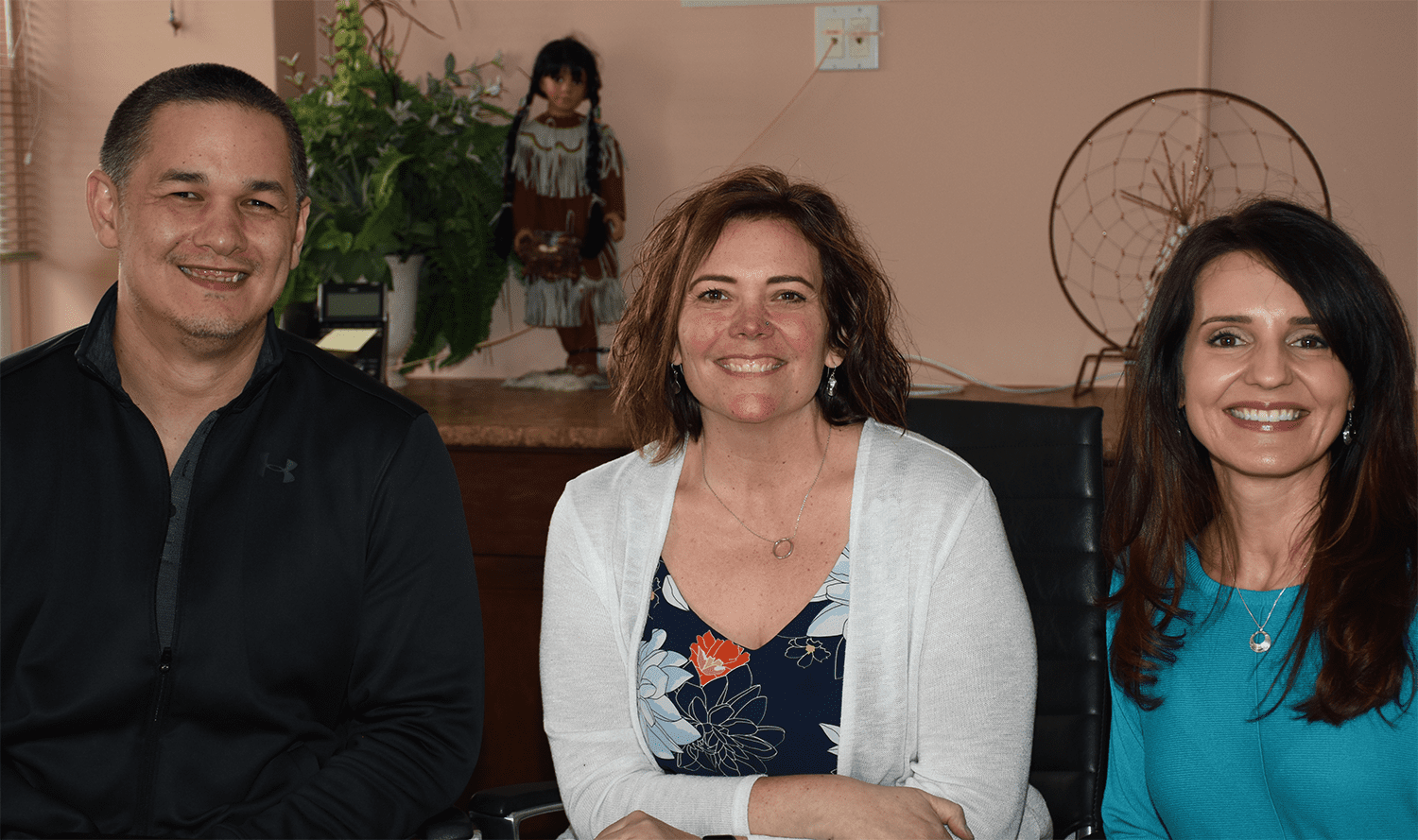
Where do we begin…
Our hope for you is that this newsletter finds you and your family healthy, safe, and managing to the best of your ability what are truly extraordinary days for us all. Spring is here and many of our staff, caregiver support parents and Elders Advisory members have been sharing how much they truly value the sunshine we are having, and the feeling spring brings for them.
The first quarter of 2021 has been very exciting for our agency. What a difference three months makes! In our last newsletter, we talked about the very busy winter. We have some news to share on several issues related to facilities and infrastructure and how we are working to move our agency forward in a good way.
First, we started the year by launching a BC wide Gratitude Contest. Looking at the 92 entries really warmed our hearts as we could see the passion, talent and heart that went into the submissions. We are so proud that an article was featured by the media showcasing this talent!
We recently learned that Building 1 in Chilliwack, where we are headquartered, is going to be demolished and we need to be vacated by June 30, 2021. This was something we anticipated, as the building is quite old. Being a former hospital for TB and a former residential school has brought up many feelings for people. We are thankful for the partnership with Stó:lō Service Agency and the 14 offices that they have generously offered for some of our staff to occupy at Building 7 the Health Unit, on the Coqualeetza grounds right beside our current location. We are also looking at other facilities for staff downtown to house family strengthening services.
We are also very excited about a new space we are leasing upstairs of Service Canada on the corner of Main Street and Wellington in Chilliwack! We are currently renovating this space which will be dedicated for youth-focused work. We will have Elders on site and space for contractors to provide supports for youth. We will start with a soft launch in May with a grand opening later when it is safe to gather.
We will also have grand openings for the building in Abbotsford that we moved in during Covid-19, as well as the office that opened at Tzeachten First Nation.
Our agency has been a key partner at a center that has not been named yet, that will be a place in Chilliwack to give indigenous children, youth, and families a place to gather and feel a sense of belonging. Xyólheméylh has agreed to put our contribution into programming costs, which will consist of drum making classes, beading, cooking, jigging classes and more. We look forward to writing more about this in our next newsletter.
It has been almost two years since the start of the restructure of our agency into baskets to be able to have consistent practice throughout our region for children, youth and families. From a practice standpoint we are seeing an increase in prevention supports, case compliance, and expertise in each basket area. We are also working with Metis Nation BC and the Métis Commission of BC on doing Métis specific caseloads, and programming to the 33% of our files that are Métis in our agency.
Our agency Board of Directors had Dr. Sarah Morales from the University of Victoria spend a day and a half with us last August focusing on the new C-92 Federal Legislation. This relationship has grown to where our agency has law students complete their hours of their Law program working alongside our ELT in the agency. Their research and tasks that they completed will be beneficial towards our pilot projects; one being a new court model.
With a year now into the pandemic, we lift our hands to staff and caregiver support parents for their tireless dedication to the work, our Elders Advisory Council for their wisdom and guidance, and to the Visions and Voices Youth for their valued advice, and to the Board of Directors for their ongoing support. It is the spirit of our collective vision and walking alongside one another in partnership as we work in LÉTSÉ MÓT TÉ SQWÁLEWEL – “With a good mind, a good heart, and good feelings” that will continue to propel our momentum moving forward in a good way to benefit all of those we are blessed to serve.
Rod Spitzig, Kyla Darby and Penny Trites
Update from Penny Trites, Executive Director of Staff & Community Relations
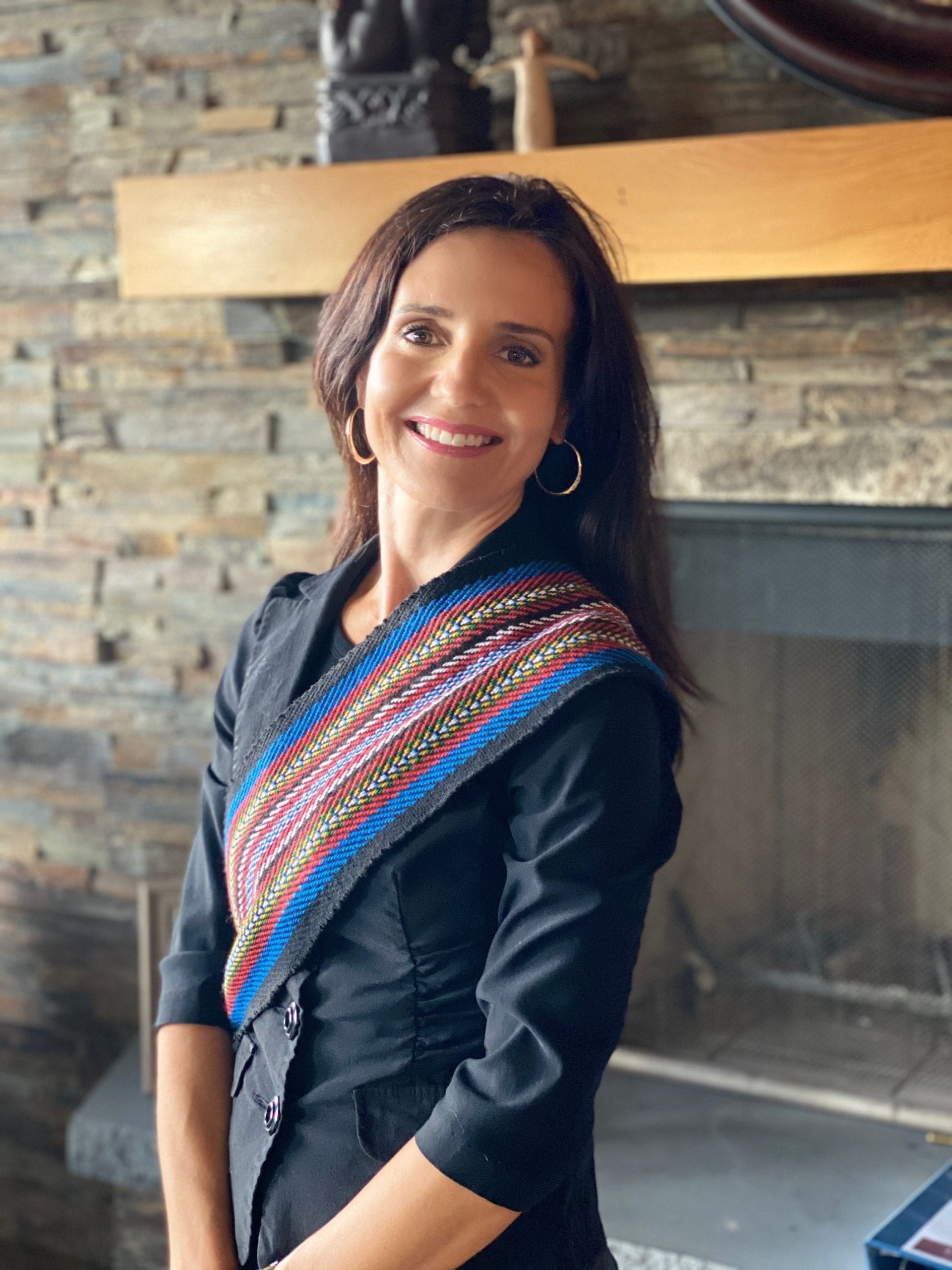
Sowing Seeds
I proudly celebrated my year anniversary in my role with Xyólheméylh where I immediately felt the spirit of the agency and the feeling of family. It was just prior to spring; new beginnings for me. Springtime energizes me as we have longer days, warmth, and sunshine. It is the time I get back to my passion of gardening and cycling.
In my garden the other day I was thinking about what I would write about for this newsletter edition. A line of a song popped into my head… “Let My Heart Sow Seeds in You.” I then immediately thought of Chris… one of my friends’ moms I looked up to; a person who changed my life who is no longer with us today. It was two years after my dad had died and my brother had been taken away by Social Services. I was 16, and in a very dark place, feeling like I had lost all hope. One day she spent time with me and shared about how hard it was when she lost her mom as a teenager. She told me how special I was and all the gifts I had. She cried, hugged me, and told me how much she loved me. Who would have known that those 10 minutes of someone planting seeds of hope in my heart would have changed my life forever?
Two Elders who are a great support in my life have said to me,
“ It is so important to have hope in our hearts and share kindness and love to others by doing all things with a good heart and a good mind. This is how we live a good life and bring light to others where there could be darkness.”
What would our world be like if we followed this teaching? As we move through the season of springtime watching the buds open on the trees and seeing life literally springing out of the earth, my wish is that we focus on “sowing seeds” within ourselves and one another; water them with good thoughts, good words we speak and actions we take, to see the benefits our seeds produce in the days, weeks, months, and years to come.
Penny
Gratitude Art contest
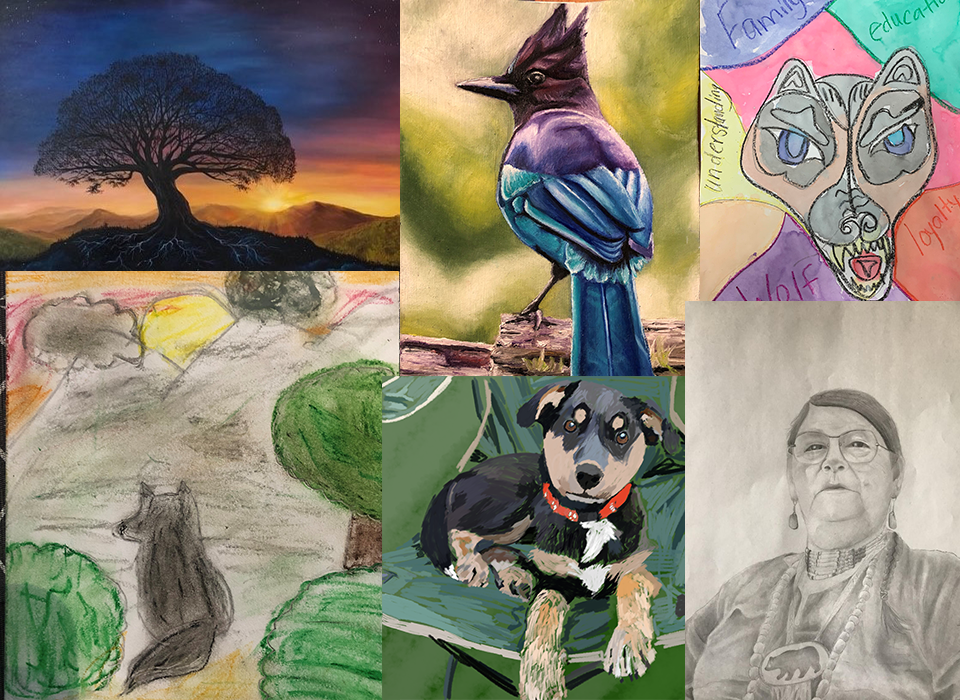
In these strange times we are living through, Fraser Valley Aboriginal Children & Family Services Society decided it was the right time to ask Indigenous children and youth in British Columbia what they are grateful for.
The Agency received over 90 submissions in two age categories – ages 3 to 12: and ages 13 to 19. Common themes were family, Indigenous culture, friends, pets, nature, school, home, art, sports, and ice cream. The winning entries were voted by a panel of Elder advisors and Board of Directors members.
The art of the children and youth is inspiring and reminds us there is much to be grateful for, and we are grateful for their gifts of artistry,” said Marion Mussell, Board of Directors President.
“We could feel the heart and spirit that went into the many submissions we received” said Penny Trites, Executive Director Staff and Community Relations. “The art the children and youth produced was so uplifting.”
The winners in the age 3 to 12 category were: Summer-Quill, 12; James, 8; and Taya, 12. The winners in the age 13 to 19 category were: Miranda, 16; Angel, 16; and Sebastien, 14.
One youth said she was “Grateful for mother nature and the land we live on.” Another sketched a portrait of her great grandmother.
The winner’s artwork has been made into Thank You cards for the Agency, as well as displayed in the Agency’s locations in the Fraser Valley. The winners also received cash prizes.
Meet an Elder: Louise Silver Kaarsmaker
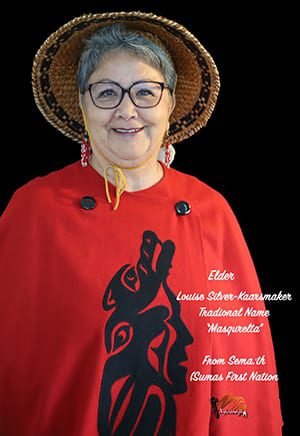
Louise never imagined after retiring as a social worker from Xyólheméylh seven years ago that she would return as an Elder, but that’s what happened and she’s enjoying her new role. “I’m now standing on the outside looking in and sometimes able to see what the social workers and parents can’t see. It’s a nice role,” says Louise. “I’m a happy Elder.”
Louise, whose traditional name is Masquaelta, is from the Sumas First Nation and the daughter of Dr. Ray Silver and Irene Silver. Her grandparents on her father’s side were Ambrose and Jean Silver, and on her mother’s side, Sol and Louisa Miller. She is the eldest of 12 children.
Louise worked with Xyólheméylh for twenty years and has seen a lot of changes in the agency since the beginning when there were only seven staff working out of a basement of a house on Stó:lō grounds. There were also only seven foster parents so at one point, some of the social workers had to take the kids home with them.
One of the welcome changes as been the introduction of collaborative practice. “Social workers are now giving families a voice, allowing parents to do the work and plan for their children. That’s a big deal,” says Louise. “When I was doing child protection we were told we had more power than the police. Back then we were the ones dictating to the parents . .. Now we’re allowing the parents to find their own way to protect their children.”
Growing up, Louise's culture did not really teach her about her Indigenous culture. She was ten before she went to a Longhouse and her mother was a strict Roman Catholic. It wasn’t until she started working at Xyólheméylh that she began learning about her culture and her eyes were opened to different cultural practices such as sweat lodges.
She credits Skowkale Elder Mary Uslick with helping her to understand that everything has a life, that we’re here on earth for a purpose and we’re here to respect everything on earth, including Mother Earth. “It took me a long time and a lot of soul searching to find out who Louise is and where I belong on this earth,” says Louise. “I believe children in care should be given the opportunity to find out who they are, their roots and where they belong.”
Louise has two sons and three step-children, 18 grandchildren and one great grandchild on the way, expected to arrive in April. In addition to her role as an Elder with Xyólheméylh keeping her busy, she loves volunteering at the MCC Thrift Store in Abbotsford. She is also busy preparing for her father’s memorial which traditionally occurs four years after a loved one has passed.
We lift up our hands to Louise and thank her for her wisdom that helps guide the Agency.
Meet Rebecca Easson, Director of Operations, Guardianship & Youth Services
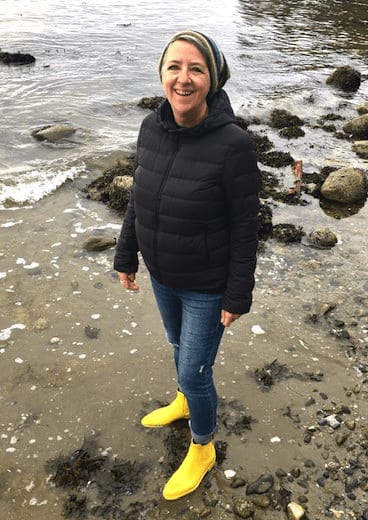
Rebecca retired at the end of March and headed up the basket that serves children and youth under a Continuing Custody Order, as well as youth on YAG’s and ILA’s, that are not serviced by the Stó:lō Services teams. The basket has over 40 staff and is now headed by Rhea Del Vecchio. The basket also includes the Agency’s SAIP Counselling Program.
When the Youth & Guardianship Basket was first created, the Basket's leadership team created a vision to help guide them in their work. The Vision states: Every child, youth & family will receive culturally meaningful services that ensure: belonging, safety, a significant support network, pride in their identity, and true knowledge of their life story…[and] through our good relationships with Communities, Nations, and Partners, service delivery will be done in a collaborative way ensuring our children, youth & families are at the centre of, and actively driving, their planning process.
Although the busy and often crisis driven day to day can be distracting, the vision has helped maintain focus on what the true goal of the work needs to be. Rebecca says, “if I were to simplify what we are trying to support all of our children & youth in achieving it is; belonging, connection, and self-determination. We want every child or youth to be able to reach their fullest potential in life, and to feel that they matter.”
Rebecca feels that it should go without saying that their dream is that no child or youth will grow up in, and age out of the system. “I know that this basket’s leadership team is extremely passionate about leaving no stone unturned and no conversation unsaid when it comes to finding permanency for children and youth outside of the system. That is not always going to be possible but then just as much time and effort is put into trying to build connections to family and community and creating networks of support and care around them that will be lifelong.”
With all of the above in mind, the team's success is measured in many different ways; seeing siblings reconnected after years apart and developing positive relationships; seeing a child or youth reconnected with extended family, and/or with family they have never known; seeing a child or youth touch their land and being welcomed into their home community; seeing youth newly embracing and taking pride in their culture and teachings; seeing a youth take ownership of their planning and creating their own lifetime networks. Some of the more impactful success stories recently have been the return of a number of sibling groups to parents after years of living apart and disconnected from each other.
“These are parents who in the past many people would have written off and never given a second chance.” Staff in various roles within the Basket come together and support the parent and children in all the practical and emotional ways needed to both start a new relationship and then learn to live together again. It is something that needs to be done with careful thought and understanding and can mean a long process. “We want to set them up for success in the immediate and the long term.”
Currently a priority for a lot of the basket staff is ensuring that the youth on their caseloads are being set up for success in transitioning out of care. “We have a lot of dedicated staff who care deeply about the youth they are connected with, and consistently go above and beyond for them. They literally would give those youth the shirt off their backs if they believed that’s what would set them on a good path forward. I see a lot of collaboration amongst the staff on the different teams, doing whatever they can to build these youth up and set them up for best outcomes.” Rebecca says there has also been a lot of support from the Executive Leadership Team around expanding programming and services to youth. “There are some very positive youth centered initiatives happening in the Agency and I am hopeful we will see very different outcomes for our aging out youth over the coming years.”
Rebecca says that there is one thing she needs to be really clear about – the credit for all the success in the work goes to the staff on the front line and their Team Leaders. “They are the ones down in the dirt, I cannot say enough about how hard I see everyone working, how committed they are even when they are faced with difficult days. There are so many incredibly big hearted, wise, and passionate people here.”
Rebecca retired at the end of March after six years with Xyólheméylh. She began her Social Work career with Project Parent in Surrey as a Family Preservation Counsellor. Keeping children with family and rooted in a sense of belonging has always been a passion for Rebecca. She also worked in the original ‘Family Finding’ project over 20 years ago. “We were not very popular with a lot of Social Workers, who were hoping we would support them in ticking off boxes that said we had looked for family, and the child would be available to adopt into stranger care. We had a very different philosophy and approach to the work, and 9 times out of 10 there was always family to be found.” Prior to joining FVACFSS Rebecca spent approximately 14 years with MCFD, the majority of that time within Circle 5 serving Indigenous families in Surrey and Delta.
Rebecca believes there have been a lot of positive gains in the Agency in the short time she has been here with a lot of momentum gained in terms of strength-based practice, and a focus on culture. “We have really enhanced culture in our day-to-day work and there is a deeper understanding of both what culture is (it is not just Indigenous artwork in the hallways), and how vital it is to the well-being of all the children & youth we serve. I believe there is also a bigger collective feel of everyone working together toward the same goals. There is a sense that we are all invested in really wanting to hold ourselves up as an Agency that is doing culturally grounded and justice-based practice.”
When Rebecca left MCFD to join Xyólheméylh she said many people thought she was crazy to leave her government position, “especially that Public Pension”, but she has not regretted the decision for one moment. “That is not to say sometimes it has not been challenging, the Agency has almost doubled in size since the time I joined, and that kind of growth cannot come without some growing pains. However, the work that happens here, the continued fight for equity and with it a true ability to do best practice, walking beside our families and communities, there is a depth and richness to it all that is hard to put words to. I have been challenged and humbled and have learned so much in my time here and that’s how it should be. I consider myself extremely honored and lucky to have been able to be a part of the journey of this Agency, and I’m thankful this is the where I am ending my full-time career.“
Meet Support Parent shelly fontaine
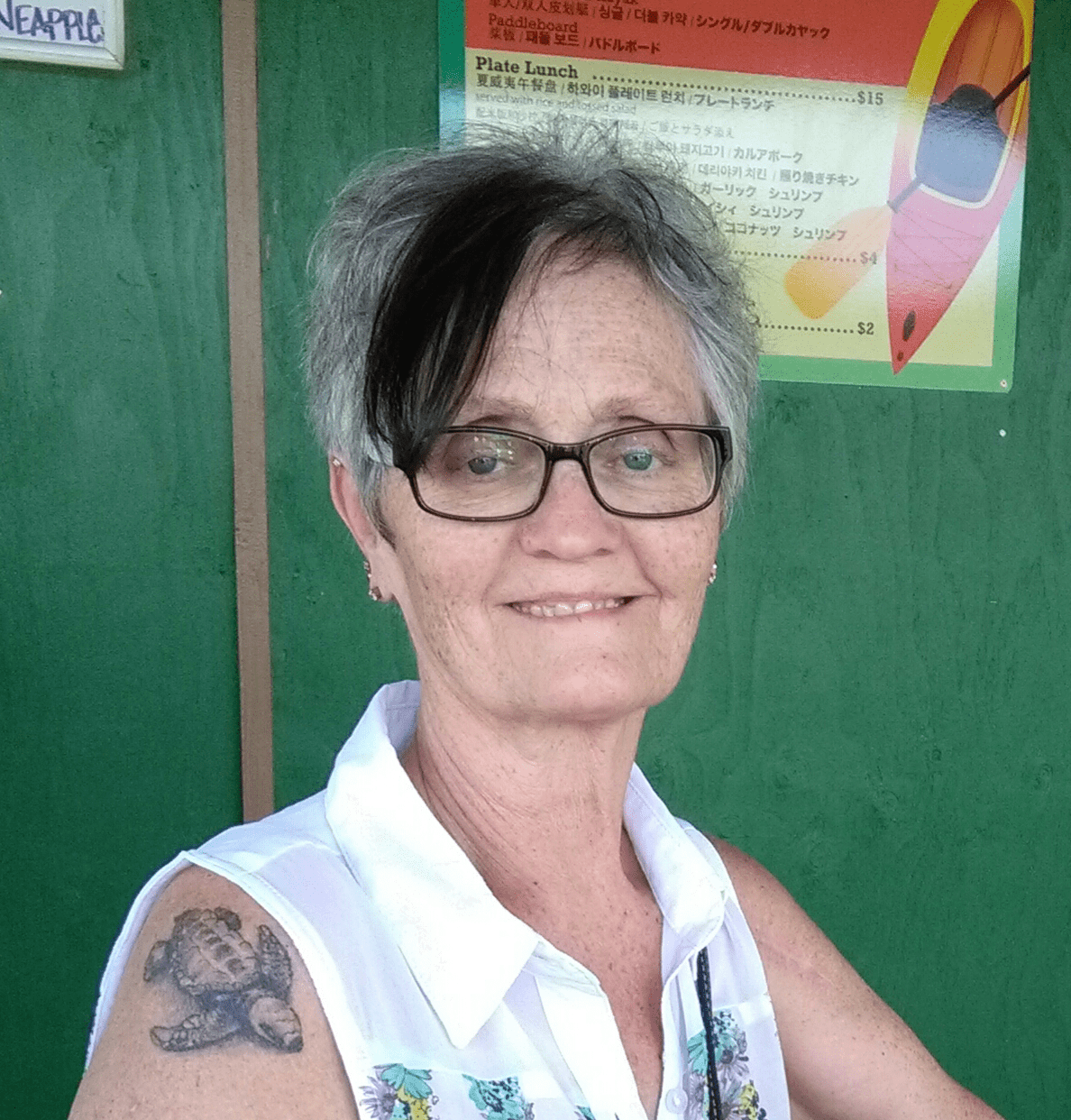
In Shelly’s 25 years of being a foster parent, she has taken care of 89 children and legally adopted five of them. We are fortunate to have Shelly in our Xyólheméylh family where she shares her big heart and her home with children who need her.
The first 18 years of being a foster parent was with the Ministry of Children and Family Development where she adopted a girl who is now 23 years old and living away from home. She also adopted two Indigenous girls through MCFD. Approximately seven years ago, she was asked to care for two Aboriginal boys and the file was transferred to Xyólheméylh. She has also continued to foster many infants, often with high needs.
In addition to four children in the home, she is currently fostering a baby. “There is a strength in these babies,” says Shelly. “I'm amazed and awed at how strong these babies are and their will to survive.”
Shelly was drawn to becoming a foster parent because she saw how much joy it gave an aunt and uncle she had as a child and she just always loved children.
Shelly fosters mostly babies and finds it difficult when it’s time for them to leave. She tears up referring to a baby she recently cared for two years. “These children have my heart. They are everything to us, and when they go, our hearts go with them,” says Shelly.
Shelly believes Indigenous culture is extremely important to the children’s sense of knowing who they are. Being non-Indigenous herself, she believes it’s important for them to be immersed in the culture from a young age. “It’s extremely important that the children know who they are,” says Shelly.
Shelly also treasures the relationships she has with the extended families. “I send a ‘back and forth’ book in the baby's diaper bag so his mother and I can stay connected regarding the baby. I send her photos of the baby in there. I also do a ‘photo album life book’ that goes with the baby when they leave my care and a "treasure box" for the babies where I put keep sakes in there for them.”
Thank you to all our support parents! We lift up our hands to you. If you are considering being a foster parent or know someone who is thinking of it, we hold regular virtual info sessions every third Tuesday of the month at 1:30 pm on Zoom. The next seesion is April 20. If you would like to register please email Norma Commodore at [email protected]
community profile: TZEACHTEN CHI’YAQTEL FIRST NATION
Interview Q & A with CHIEF DEREK EPP “WELI’LEQ”
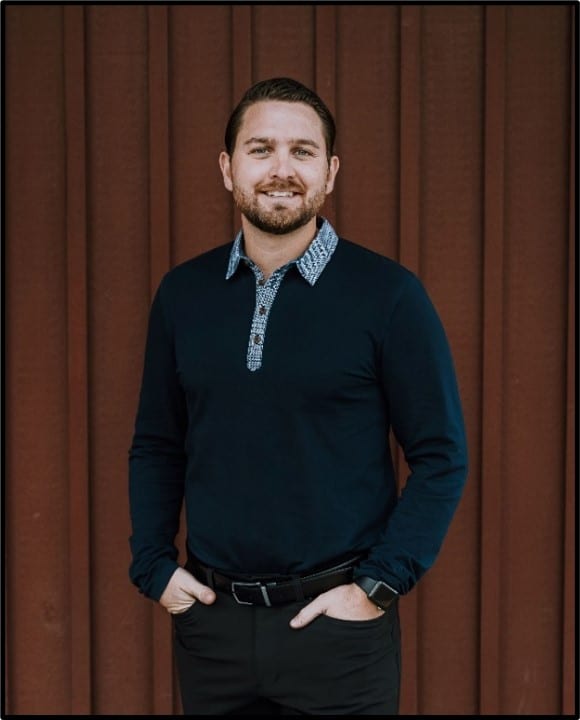
“My Goal is to lessen barriers to help people succeed and get to where we will no longer see the impacts of Colonization.” - Chief Derek Epp.
Chief Derek Epp is the first in his family to carry a traditional name. The elders gave him the name “Weli’leq” that connects him to the land and family and is something Chief Derek works hard to uphold in his role as Chief of Tzeachten First Nation.
His parents are Bruce and Sheree Epp; Grandparents are Georgina Pall and the late Lorne Robinson; Great Grandparents are the late Duncan and Dorothy Wealick. Chief Derek has been fortunate to live on Tzeachten First Nation since he was a toddler which instills his passion of understanding the importance of the land, family, and relationships within his community. Chief Derek has a BSW in Social Work and used his education to serve his community by working with Xyólheméylh prior to becoming an elected Chief for his community.
Q- What is the history of your community that is important for readers to know?
Tzeachten First Nation, located at the Vedder Crossing Plaza in Chilliwack, historically was a river where people came to fish, gather, and collect resources. “Tzeachten was what we were forced to live on… assimilate or destroy us” says Derek, “my Great Grandparents and others found a way to thrive on the land; live off the land.” Today Chief Derek speaks proudly of Tzeachten being connected to the Ts’elxweyeqw Tribe and Stó:lō Nation.
Q- Who has been your greatest support in your role as Chief?
There is no handbook or job description that teaches you how to be a Chief. Derek had just turned 27 when he was first elected as Chief of his community 4 years ago. Chief David Jimmie … Chief and CEO of Squiala First Nation and the President of the Stó:lō Nation Chiefs Council and the President of Ts’elxweyeqw Tribe has been Derek’s key support over the last four years. Derek says Dave is “calm, intelligent and really makes you think. He has taught me to be a human being, to think big and to not be afraid to fail.”
Q- What have been your greatest learnings?
The first year I worked countless hours learning to understand where I need to be. I have learned that I am not a political Chief but understand the need to use the political tools available to continue to progress Tzeachten forward. My time is best spent working for my community on social issues, bringing empathy, and compassion to the work. I learned that I needed to slow down a bit, and work from a place with the lens of helping people achieve their best self and lessen barriers to help people succeed. I also learned that systems are slow, change takes time and having our own source revenue/economic development allows me to be creative.
Q – What are you most Proud of in your leadership role?
We broke ground on two major capital projects, which directly benefit our membership. The first is our Social Development building located by the new Tzeachten Turf Field. The second completed is our Tzeachten Longhouse, that due to the Covid-19 pandemic we have had to postpone our opening ceremony for the Tzeachten Longhouse and Social Development building. Both projects are a clear investment into social development, health, programs, and culture. I am looking forward to the positive impact these projects will have for our community and membership.
We also are building 23 Unit Member housing with 1-, 2- and 3-bedroom homes side by side and set up so families can be in family systems and not be overcrowded. It is the first BC Housing Project funded by the First Nations Finance Authority. Our vision is to have the housing with access to Xyólheméylh prevention services, programs for children, social supports, a community garden… all services accessible where you do not need a vehicle to access them.
We have partnered with CYMH (Child and Youth Mental Health) and they operate an intake health clinic of our land’s office weekly. I am proud of the relationships that are being built, the focus on bridging gaps and providing of services to our members.
Q- What has it been like recently becoming a father and welcoming your baby boy into the world?
It is a whole new feeling of love and I am on holidays right now spending most of my time with him. It made me reflect on when my dad told me he never knew how to parent and he learned by doing the opposite of what his dad did. I feel really blessed to learn from my dad and I am going to do the very best for our son.
Q – What advice do you have for staff within our agency?
It is exciting to have Xyólheméylh leasing space in our community to support our membership. It is about building trusting relationships that take time, focusing on prevention, and it is about how we work collectively together.
“It’s an exciting time. Be patient, keep working hard, ask lots of questions and overcommunicate. Use the strengths in our community, build on them, and think outside the box.”
Q- Is there anything I have not asked that you feel is important to know?
Community engagement is so important… honoring the strengths of our families and just being together to share a meal simply to be together. I am so thankful for the role I am in and the opportunity it has given me to learn and grow as a person. It is so important that we honor the teachings of our Elders and work together to be a collective voice for change.
Meet a FVACFSS Board Member: Jennifer Janik
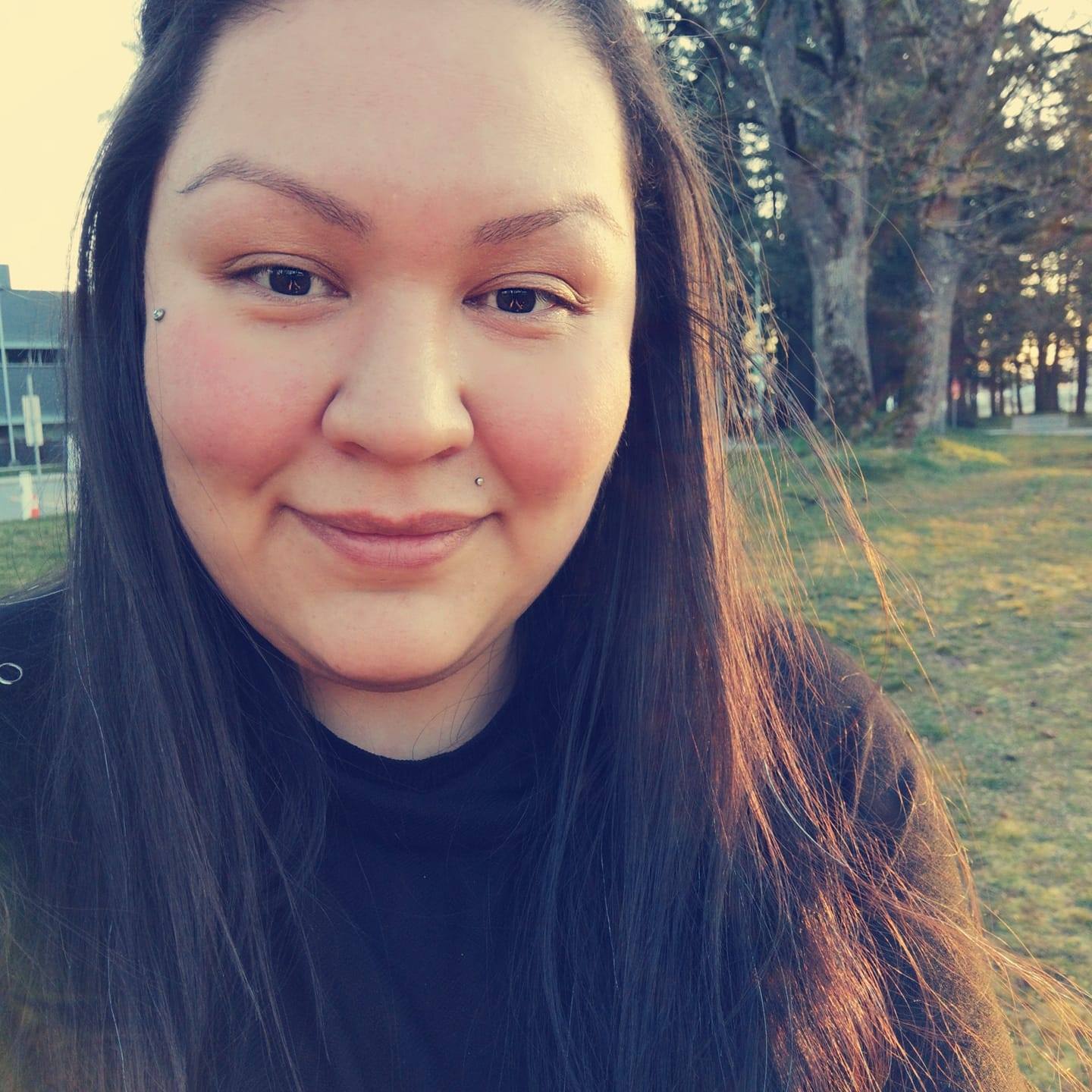
Jennifer belongs to the Roberts family of the Chi:yaqtel (Tzeachten) First Nation. She has a Bachelor of Arts from the University of the Fraser Valley as well as certificates in Communications, Halq’emeylem and Indigenous Arts. She is currently enrolled in the Certified Aboriginal Professional Administrator program (CAPA) through AFOA and works at Tzeachten First Nation as a Finance Officer.
Jennifer wanted to join the Board of Directors at Xyólheméylh because she wanted to help families heal from the impacts of colonialism and residential schools. “Our families experienced a lot of trauma physically, mentally, emotionally and spiritually and as a result it impacted our families. My motivation is the children and families whose lives were impacted and helping in their healing,” says Jennifer.
Jennifer is excited about the direction the Agency is taking and the focus on culture and inclusion of elders in all we do, as well as the increased engagement of children and youth through programs and such initiatives as art contests. “As Indigenous peoples our culture is an important part of our communities. Our culture is our identity, it's how we heal, it's how we celebrate and it's how we view the world around us,” says Jennifer.
In her spare time, Jennifer enjoys singing and dancing with her daughter who is one and a half years old, as well as baking, crafting and going for walks.
Jennifer raises her hands to acknowledge the elders, children, caregivers, families, staff and board members. “Covid has changed the way we operate as an organization and I know it isn't always easy. I pray everyone is healthy and continues to stay safe,” says Jennifer.
Ask an Elder: Rosemary Treherne
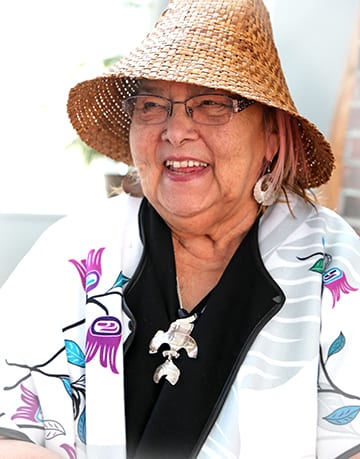
Welcome to a new regular feature in our newsletter – Ask an Elder. Do you have a question you would like answered by a Respected Xyólheméylh Elder? Send your questions to [email protected] and we will feature them in the newsletter.
In this issue, we asked Rosemary Treherne to explain how one prepares to be an Elder? This is what she told us:
“Very rarely in my life did I think about being an Elder. But throughout my life, all my experiences I was able to share with people. When I hit my 50s people started calling me an Elder and I would tell them I’m not old enough to be an Elder. But it’s not so much your age as the wisdom you have gained. I realized then there’s a lot of work to do to be an elder. I would tell young people to start thinking about it when you are in your 20s, do I want to be a Respected Elder?
“We have lots of elders, but a respected elder means the experiences you go through is what you’ll share when you’re an elder. You’re on a path to becoming an elder. You don’t have to be perfect, none of us were. It’s the willingness to share what you’ve gone through. As you get older you get more secure in yourself. If we learn from our mistakes, we’re able to do things in a better way. I think of people who’ve been on the street, violent, when they get older if they heal, if we get on the right path, they can still become an elder. It’s not to have led a perfect life, it’s through our mistakes and learning, that we become an elder. “
Monthly caregiver giveaway draws
In order to express our gratitude to our Caregiver Support Parents who are such an important part of the Xyólheméylh family, we will be having a draw every month for a gift basket. The baskets will be different every month but will be filled with thoughtful gifts to show our gratitude.
The winner for January is Gillian and Kenneth Aviss. Congratulations to Gillian and Kenneth! They won a basket with all the essentials for a Covid style family night in: $150 Skip the Dishes Gift Certificate; $50 Cineplex Gift Certificate to rent movies at home; and popcorn, chocolates and treats.
February's winners were Nicole Sam & Joshua Siah. Nicole and Sam won a $250 Gift Card to Spa Utopia, Blackberry Safe Hand & Body Lotion, Beautiful Day Bath Bomb, and Blackberry Safe Beeswax and Soywax Candle, all by Sequoia (Proudly Indigenous).
March's winner was Amy Towe who won a $250 garden-themed basket. The basket included a gift certificate to Minter Country Garden, tools, gloves, a plant mister, peat pots, seeds, a garden journal and Magnolia magazine.
Thank you to all our caregivers!
